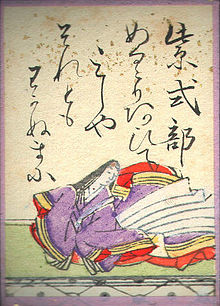- Murasaki
-
This article is about a character from The Tale of Genji. For other uses, see Murasaki (disambiguation).
Murasaki refers to both the heroine of the Genji Monogatari (The Tale of Genji), and the book's author, Murasaki Shikibu. Curiously, in both cases the name is a pseudonym, and the real names are unknown.
In the court manners of the time (the Heian Period), it was considered unacceptably familiar and vulgar, to freely address people by their personal name, or even by their clan's name. As a result, the real name of the author is lost, and she was called Murasaki Shikibu: Murasaki after the heroine she invented; Shikibu after her father's official rank. The author Murasaki was an aristocrat, the daughter of a provincial governor who probably belonged to a minor branch of the mighty Fujiwara clan. She served as a lady in waiting to the Empress Shoshi (a daughter of the powerful Fujiwara Michinaga), and was a literary contemporary and rival of Sei Shōnagon.
When Murasaki Shikibu wrote The Tale of Genji, she followed the customs of her class and time, so that most of the characters in the novel are never identified by name, but rather by either their rank and title (in the case of male persons), rank and title of their male relatives (in the case of female persons), or after the name of their habitation (in the case of the great court ladies). Thus in the case of Murasaki, the lady in the novel, the author often calls her "The Lady of the West Wing". This "Lady of the West Wing" is commonly named Murasaki in commentaries and translations. Today, this serves to make the novel more easily comprehensible to those unfamiliar with Heian era court manners and titles, but we know that the author's contemporaries already referred to this character by this name - and nicknamed the author after her.
The name Murasaki is inspired by a poem that the novel's hero, Genji, improvises when contemplating his first meeting with the novel's heroine, the little girl which will grow up to be "Murasaki".
"How glad I would be to pick and soon to make mine that little wild plant sprung up from the very root shared by the murasaki."
(Translation by Royall Tyler in The Tale of Geni by Murasaki Shikibu, translated by Royall Tyler, 2001, ISBN 0 1424.3714 X, p. 100)
Murasaki (紫) is the Japanese word for the color purple. Other translations include Lavender, as used by Edward Seidensticker in his English version of the Genji Monogatari; Violet; and Violet Root, which in Japanese poetry denotes Love and Constancy.
Now Genji, in his poem, names the murasaki or purple gromwell, because its color resembles the color of the wisteria (in Japanese, fuji) thereby obliquely referring to Fujitsubo, "the Lady of the Wisteria Court", a woman he is violently in love with for the first part of the novel. It happens that this lady Fujitsubo is little Murasaki's aunt.
Thus, in a word association game very characteristic of Japanese poetry, the similarity between two colors - the deep purple of the violet, and the light purple of the wisteria - led to the name Murasaki, perhaps the most illustrious name in Japanese literature.
Categories:
Wikimedia Foundation. 2010.

